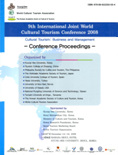Motivation of Attendees to Cultural Festival
- 세계문화관광학회
- Conference Proceedings
- 9th International Joint World Cultural Tourism Conference 2008
-
2008.11110 - 118 (9 pages)
- 6

Cultural festivals and events have become an important attraction to both the local community and tourists. In order to attract visitors to cultural events, event organizers and stakeholders have to understand why attendees would like to attend a particular event. Despite the growing importance of cultural events, very few academic researches have been carried to elucidate attendees' motivation to attend cultural events particularly in the African context. This paper fills the void in the attendees' motivation to cultural events through answering "What motivates attendees to participate in a cultural music festival?" Sauti za Busara (Sounds of Wisdom) music festival that is held annually for four days within first two weeks of February in the Zanzibar Island off the shore of Tanzania was used as a case study. Four hundred self-administered questionnaires were filled and returned by the attendees. The data obtained were subjected to qualitative and quantitative analysis where thematic analysis was performed on the qualitative data and descriptive together with cross tabs and Chi square analysis were performed for the quantitative data. Male attendees were twice the female and more than 70% were youth (18-39 years). Reasons for attending the festival include entertainment, education, and experiencing different cultures. Most locals were after the educational while tourists were after cultural experience. Empirically, motivation to attend a cultural event is influenced by attendees' country of origin, gender, and age. Both locals and tourists believe cultural festivals to have positive social and economic value and some negative social and environmental consequences. Event organizers and marketers need to promote events according to the possible attendees' motivation that depends on attendees' as well as socio-cultural factors. Other event stakeholders have to address the actual and perceived negative consequences of cultural event for them to be sustainable.
ABSTRACT
Introduction
Literature Review
Methodology
Results
Conclusion
References
(0)
(0)